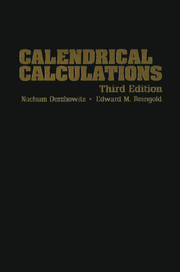Book contents
- Frontmatter
- Dedication
- Contents
- List of Frontispieces
- List of Figures
- List of Tables
- Abbreviations
- Mathematical Notations
- Preface
- Credits
- License and Limited Warranty and Remedy
- About the Cover
- 1 Calendar Basics
- I ARITHMETICAL CALENDARS
- II ASTRONOMICAL CALENDARS
- III APPENDICES
- Index
- Envoi
- About the Cover
1 - Calendar Basics
Published online by Cambridge University Press: 05 February 2014
- Frontmatter
- Dedication
- Contents
- List of Frontispieces
- List of Figures
- List of Tables
- Abbreviations
- Mathematical Notations
- Preface
- Credits
- License and Limited Warranty and Remedy
- About the Cover
- 1 Calendar Basics
- I ARITHMETICAL CALENDARS
- II ASTRONOMICAL CALENDARS
- III APPENDICES
- Index
- Envoi
- About the Cover
Summary
A learned man once asked me regarding the eras used by different nations, and regarding the difference of their roots, that is, the epochs where they begin, and of their branches, that is, the months and years, on which they are based; further regarding the causes which led to such difference, and the famous festivals and commemoration-days for certain times and events, and regarding whatever else one nation practices differently from another. He urged me to give an explanation, the clearest possible, of all this, so as to be easily intelligible to the mind of the reader, and to free him from the necessity of wading through widely scattered books, and of consulting their authors. Now I was quite aware that this was a task difficult to handle, an object not easily to be attained or managed by anyone, who wants to treat it as a matter of logical sequence, regarding which the mind of the student is not agitated by doubt.
—Abū-Raiḥān Muḥammad ibn 'Aḥmad al-Bīrūnī: Al-Āthār al-Bāqiyah ‘an al-Qurūn al-Khāliyah (1000)Calendrical calculations are ubiquitous. Banks need to calculate interest on a daily basis. Corporations issue paychecks on weekly, biweekly, or monthly schedules. Bills and statements must be generated periodically. Computer operating systems need to switch to and from daylight saving time. Dates of secular and religious holidays must be computed for consideration in planning events. Most of these calculations are not difficult because the rules of our civil calendar (the Gregorian calendar) are straightforward.
- Type
- Chapter
- Information
- Calendrical Calculations , pp. 1 - 42Publisher: Cambridge University PressPrint publication year: 2007



